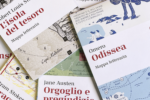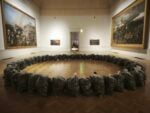59. Biennale – Padiglione Messicano
 (1200x677).jpg)
Il progetto Until the Songs Spring rappresenta il Messico alla Biennale di Venezia.
Comunicato stampa
The Ministry of Culture of the Government of Mexico and the National Institute of Fine Arts and Literature present the national pavilion entitled: Until the Songs Spring, curatorial work of Catalina Lozano and Mauricio Marcin, which will represent Mexico in the 59th International Art Exhibition of La Biennale di Venezia 2022.
Until the Songs Spring explores the ways in which Mariana Castillo Deball, Naomi Rincón Gallardo, Fernando Palma Rodríguez, and Santiago Borja (in collaboration with El Camino de los Altos) approach forms of knowledge that have not been fully colonized , affirming opposite and alternative ways of life to counteract an anthropocentric vision which has been modeled by an univocal principle of progress. The title, a variation of a verse from the Poem of Temilotzin (Temilotzin icuic) – a commander and defender of Tenochtitlan against the invaders, as well as a famous poet and friend of Cuauhtémoc – evokes the persistence of the struggles to defend images of the future that have not been captured by the hegemonic paradigm of modernity.
"I have already come,
I stand up, I will forge songs,
I will make the songs sprout, for you, our friends. I am sent from God,
I am the possessor of flowers,
I am Temilotzin, I have come to make friends here."
"Ye on ya nihualla,
ye on ninoquetza,
cuica nonpictihuiz,
cuica nonquixtihuiz,
antocnihuan.
Nech. hualihua teotl,
nehua ni xochhuatzin,
nehua ni Temilotzin,
nehua ye nonteicniuhtiaco nican”.
In this edition, the Mexican Pavilion seeks to bring to the fore ways of thinking and perceiving the present that question the characteristic separations of colonial modernity. Until the Songs Spring interrogates the modern Western separation of humanity from nature which has created the commodification of “natural resources.” The project also seeks to assert a wide and open notion of technology, freed from a mechanistic determinism, acknowledging ancestral practices today referred to as “crafts”, “rituals”, and “popular art” as advanced and effective ways of negotiation between different realms of experience and fields of knowledge. The works in the exhibition explore transactions between cultures and knowledges that disobey the exoticist musealization of dissident practices. Countering the colonial mandate of reducing non-dominant languages to lesser cultural expressions, the works proposed offer the possibility of resisting the crushing expressions of an inoperative mono-cultural Mexican state.
This exhibition is a collaborative effort that embraces the tensions inherent to the coexistence of different worldviews in a modern political construction such as the Nation-state. By imagining decolonial futures that may rid us of realities of oppression, subduing diverse human, non-human, and more- than-human life forms today, Until the Songs Spring proposes a rearticulation of myth and logos in order to offer an alternative methodology that unlocks new speculative realities.
Mariana Castillo Deball (Mexico City, Mexico, 1975) presents Calendar Fall Away, a newly commissioned floor-based work for the Mexican Pavilion. Conceiving the space as a large printing press, the artist turns the exhibition floor into a printing matrix that occupies the entire Pavilion. In this piece, the artist explores her interest in the hybrid character of documents produced after the colonization of America. Calendar Fall Away takes as departure point a calendar wheesl used to translate the Mesoamerican to the Gregorian calendar, as well as the imagery that appeared in European painting as a result of the colonization of the Americas.
Naomi Rincón Gallardo (North Carolina, USA, 1979) will present Sonnet of Vermin (2022), an audiovisual work produced for the Pavilion, in which she investigates the concepts of the Mesoamerican underworld and Mixtec funerary practices to evidence the extractive and anti-ecological processes that occur in some regions of the state of Oaxaca in Mexico. The result is a video installation that is combined with two "characters" of the film created through artisanal processes that mix eclectic materials and draw a parallel with Mesoamerican sculptures.
Fernando Palma Rodríguez (Mexico City, Mexico, 1957) will exhibit Tetzahuitl (Omens) (2019), an installation of 43 girls’ dresses that move according to patterns inspired by Mesoamerican shamans when they become nocturnal birds. Tetzahuitl alludes to the Nahuatl word that refers to the manifestations of Nahua divinities that announce and provoke future events; it is at the same time a message and an invocation that aims to raise awareness about ecological devastation, forced migration, and the various forms of violence provoked by capitalism.
Santiago Borja (Mexico City, Mexico, 1970) will present Talel (2022), a textile installation made in collaboration with El Camino de los Altos, a group of weavers from Bautista Chico (Chamula, Chiapas). The work consists of 23 textiles that re-interpret in an experimental and collaborative way how the human genome has been represented in science. Through variations and subjective modifications, the work reflects on notions of genetics and epigenetics, which could be translated into the binary form in which modernity separates nature from culture. In this way, this schematic distinction often questioned by contemporary anthropology is discussed within the context of contemporary art.
We appreciate the support of Fundación INBA, A.C. , Jumex Contemporary Art Foundation, A.C. and the Isabel and Agustín Coppel Collection, A.C. for the realization of the Mexican Pavilion.
Additional support was provided by Casa Dragones, Gaga, and Kurimanzutto.
Comissioner: Diego E. Sapién Muñoz
Curators: Catalina Lozano and Mauricio Marcin
Website: bienaldevenecia.mx



